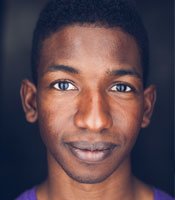Here are some fast facts about Jonny, the character played by Mamoudou Athie in The Mystery of Love & Sex: he is 21 years old, a writer, and a Christian. Like the other three characters in the drama, he faces significant questions of personal identity.
But identity, Athie told me the other day, wasn’t the first thing he noticed upon his initial encounter with the play. “When I read it, what struck me was the idea of friendship.” He added: “And I noticed that Jonny’s mother was a huge presence for him. Now that we’re in previews, I’m struck by how open and honest I need to be to play him.”
Athie, who grew up in the suburban-D.C. part of Maryland, finds this demand for honesty to be a welcome challenge. “The story presents him with some extreme circumstances, which makes bringing him to life both frightening and exhilarating.” As for the text, by Bathsheba Doran, Athie said that “it’s one of the most beautiful plays I’ve read in a long time.”
That’s high praise for someone who last May finished his three-year course at the Yale School of Drama, a program not known for stinting on exposure to the word. “The second year,” Athie said, “was almost entirely devoted to classical texts – Shakespeare, Chekhov.”
I asked Athie to relate his study of Shakespeare to Jonny. “It may sound obvious, but I’d have to mention Hamlet. He has a very complicated relationship with his mother. And he has this huge burden he has to deal with alone. But Jonny’s battle is more private. Hamlet’s inner turmoil is put onstage.”
Another playwright who figured mightily during Athie’s training was August Wilson. “Along with a friend and fellow student of mine – Jonathan Majors – I started a project to present readings of Wilson’s work. We did all ten plays of Wilson’s Pittsburgh cycle. I wasn’t sure I could live up to his standard.” He added: “But August Wilson is as universal as Shakespeare. And, like Shakespeare, just by saying the lines you can bring his world to life.”
Since Athie and I had our conversation just offstage at the Newhouse, not long before patrons would file in, I asked him about working in that space. “For a theater of this size, it’s amazing how close you feel to the audience.” Athie said that whatever the reactivity of the audience on a given night, he always tries to keep in mind a quotation that he first heard from one of his teachers at Yale, Evan Yionoulis.
“It’s something that Ariane Mnouchkine, of the Theatre du Soleil, said about every performance: ‘This is someone’s first time in the theater, and someone’s last time in the theater.’ In other words, you have a responsibility, so make it count.”
Brendan Lemon is the American theater critic for the Financial Times and the editor of lemonwade.com.
